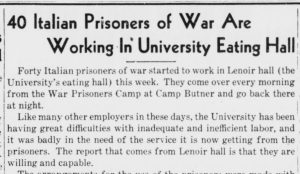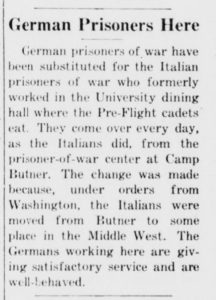During World War II, UNC employed Italian and German prisoners of war in the dining halls. Beginning in 1942, the Navy rented facilities from UNC to operate a Pre-Flight Training School and other training grounds. As part of that arrangement, Lenoir Hall became a dining hall exclusively for Pre-Flight Cadets. Renovations to Lenoir gave it a seating capacity of 1,800. To maximize efficiency, waiters served the meals “family style” as opposed to having the cadets wait in a cafeteria line. Some of those waiters were POWs bussed in from Camp Butner in Granville County, northeast of Durham.
Camp Butner would become the largest POW camp in North Carolina with 889 prisoners as of June 1944. While most of the Butner prisoners maintained the military installation, others worked outside the camp for civilian businesses. A report on Camp Butner from April 1945 counted 110 prisoners employed as mess attendants at Duke University and UNC.

The decision to use prisoners of war was a result of ongoing difficulties finding enough people to work in the busy dining halls. With Lenoir Hall serving the nearly 2,000 cadets on campus at a time, Swain Hall was re-converted into a dining hall for the civilian UNC population.
 In November 1943, the Chapel Hill Weekly announced, “40 Italian Prisoners of War Are Working in University Eating Hall.” There had been no previous notice, so their arrival was a surprise to students and cadets on campus. According to the Chapel Hill Weekly article the POWs wore uniforms with the initials “P.W.” on the collar. They could be seen coming and going from Lenoir Hall, but students were prohibited from talking with them. (Chapel Hill Weekly, 19 November 1943).
In November 1943, the Chapel Hill Weekly announced, “40 Italian Prisoners of War Are Working in University Eating Hall.” There had been no previous notice, so their arrival was a surprise to students and cadets on campus. According to the Chapel Hill Weekly article the POWs wore uniforms with the initials “P.W.” on the collar. They could be seen coming and going from Lenoir Hall, but students were prohibited from talking with them. (Chapel Hill Weekly, 19 November 1943).
This caused a brief controversy in town as the people previously working in Lenoir were concerned about losing their jobs. UNC William Carmichael assured the employees (primarily women) that all of them would keep their jobs at the university, but they would be temporarily transferred to other dining halls on campus. University and government officials had determined that it would be easier to manage the POWs if they were all working in the same place. (Chapel Hill Weekly, November 25, 1943).
 On June 30, 1944, the Chapel Hill Weekly reported that the Italian prisoners working at Lenoir had been replaced by German prisoners. The Italians were being transferred to “some place in the Middle West.” According to the article, “the Germans working here are giving satisfactory service and are well-behaved.”
On June 30, 1944, the Chapel Hill Weekly reported that the Italian prisoners working at Lenoir had been replaced by German prisoners. The Italians were being transferred to “some place in the Middle West.” According to the article, “the Germans working here are giving satisfactory service and are well-behaved.”
There is very little information on these war prisoners in the University Archives. The papers of the Vice President for Finance mentions them twice with respect to the financial arrangement between UNC and the Navy. The Daily Tar Heel, however, offers more information about the German war prisoners and their reception on campus. Barbara Swift, an opinion columnist, observed the prisoners “lying in the grass in front of Lenoir Dining Hall . . . laughing and talking, playing with a pack of campus poodles that happen[ed] by.” She further speculated that “some profound change has come over these prisoners who have seen a tiny part of America.” According to a 1980 thesis about the Pre-Flight School by Mary Layne Baker, German POWs (with accompanying security guard) attended baseball games on campus (Baker, p. 93).
Others were more cynical. A student objected to Swift’s “rosy picture of healthy boys,” instead depicting the war prisoners as “arrogant and conceited.” He further argued that “They are not willing to accept or even listen to our beliefs and ideals. They regard us as stupid, lazy Americans.” This small debate in The Daily Tar Heel reveals something about the German war prisoners at UNC. Though they are well hidden in the historical record, the German prisoners were a familiar sight to UNC students. However, students rarely engaged with them. It is unknown whether careful guarding, social taboos, the language barrier, or some combination thereof isolated the prisoners from the students. People who worked in the dining hall clearly had contact with the prisoners, but the archive has no record, that we could find, of those relationships.
This post updated May 2023.
Citations:
Mary Layne Baker, “The Sky’s the Limit: The University of North Carolina and the Chapel Hill Communities’ Response to the Establishment of the U.S. Naval Pre-Flight School During World War II,” MA Thesis, UNC-Chapel Hill, 1980.
Robert D. Billinger Jr., Nazi POWs in the Tar Heel State, (Gainesville: University Press of Florida, 2008).
Barbara Swift, “They Tell Me,” Daily Tar Heel, 5 August 1944.
“Unknown Writer Insists Nazi’s Arrogant,” Daily Tar Heel, 8 August 1944.

My mother, Araminta Jane Thomas, was a student at UNC during WWII and told us that the prisoners in the dining hall were respectful and appreciative of the opportunities they were given. I always thought it would a great story to hear from some who were here and sent back to Germany.